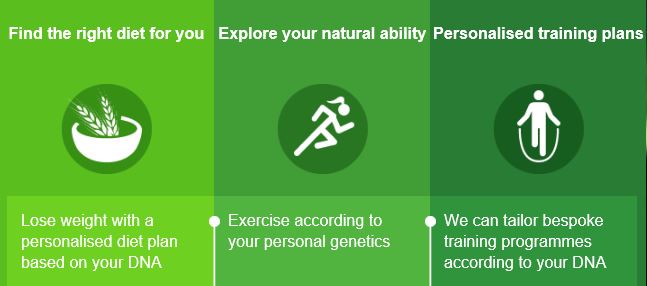
What DNA Testing can do for you?
Our genes make us who we are, so naturally they impact every aspect of our health. Understanding your DNA will help you live a healthier life.

Understanding your genes is like your own personal map to weight management. Why try to find your way without a map right? Know the genes that you carry, and how they affect your ability to manage your own weight. Use this knowledge to pick the right diet and/or training for you, specifically.
Premium DNA Package
My Premium DNA Package is a complete package including reports, nutrition plan, training plan and even a shopping lithat consists of 2 areas:
NUTRITION
FITNESS
DNA-Nutrition tests a select number of genes that impact metabolism and exercise. These genes are involved in regulation of energy expenditure, appetite, and fat metabolism, all play an important role in weight regulation. In fact 40% to 80% of the variance in body weight is due to genetic factors. This helps to explain why not everyone becomes obese even though people may be exposed to similar environments. Genetics determines an individual’s susceptibility to obesity when exposed to an unfavourable environment. It also explores the way a person responds to diet and exercise.
DNA-Fitness provides insight to the potential for sporting performance and trainability, optimal exercise selection, recovery strategies and injury risk. The test is suitable for ANY fitness levels, from the elite performance athlete to the recreational gym buff looking to maximise their training returns and reach peak levels of conditioning. The profile tests for genes in three categories that relate to sporting performance:
- Power and Endurance,
- Injury Risk and
- Recovery.
Power and Endurance: where does you performance potential lie? Are you a sprinter or should you be spending hours training for marathons? We analyse genes that encode physiological factors such as circulation, blood pressure control, strength, cardio-pulmonary capacity muscle fibre type specialisation, muscle fibre hypertrophy, cardiac output, muscle metabolism and adaptability to training regimes.
Injury Risk: This section examines genes that are involved in the structural integrity of soft tissues in the body. Certain polymorphisms implicate predisposition to tendon injuries (including Achilles Tendonitis), plus ligament, cartilage and bone pathology.
Recovery: These genes are the best example within this genetic panel of the need to integrate training and nutritional advice when supporting an athlete’s health and fitness. The featured genes consider disposition to inflammation and free radical stress within the body, which may imply the need for more focussed nutritional support, along with extended recoveries between training repetitions and sessions
Premium DNA Package
Fitness & Nutrition- Genotype Guide
- Detailed guide to every genetic variant in your report
- 4 Fitness Reports:
- 1. Power vs Endurance Report
- 2. Injury Predisposition Report
- 3. Recovery Profile
- 4. Aerobic Response
- 7 Nutrition Reports:
- 1. Diet ‘Type’ Recommendation
- 2. Carbohydrate & Fat Sensitivity / Response
- 3. Lactose Tolerance
- 4. Coeliac Predisposition & Gluten Tolerance
- 5. Detoxification
- 6. Vitamin & Macronutrient Need
- 7. Sensitivity Thresholds for:
- Caffeine
- Salt
- Alcohol
- Suggested Shopping List
- 12 Week Eating & Recipe Guide
- Your Anti-Oxidant Needs
- Post-Exercise Recovery Speed
- Recovery Nutrition Needs
- Fully supported
- You will have full support from me, for both nutrition and training throughout your journey.
